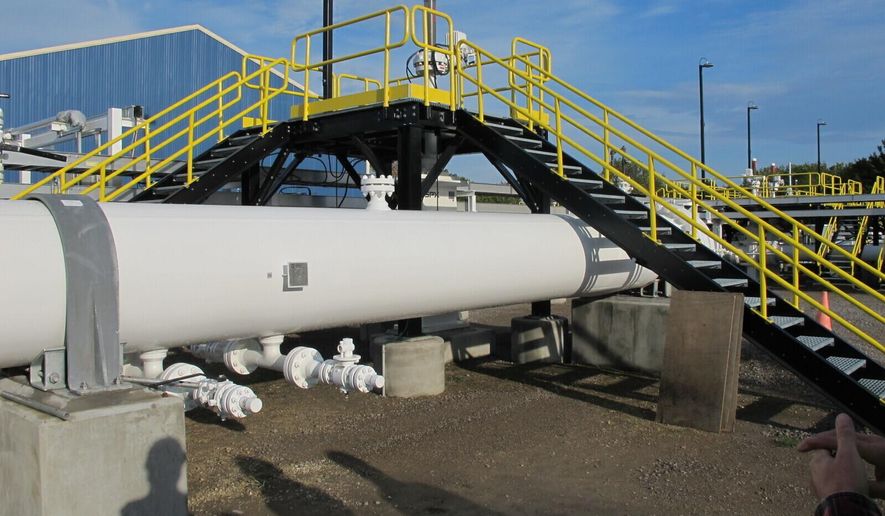The Biden administration is considering shutting down another oil pipeline, this time in Michigan, even as Energy Secretary Jennifer Granholm — the state’s former governor — conceded that heating prices will spike this winter.
White House principal deputy press secretary Karine Jean-Pierre defended the administration’s environmental review of Michigan’s Line 5 pipeline at Monday’s daily media briefing. She said no decision has been made, but confirmed that the Army Corps of Engineers is studying the matter.
She noted that Canada has invoked a 1977 pipeline treaty, in an effort to keep the oil flowing.
“We expect that both the U.S. and Canada will engage constructively in those negotiations,” she said.
She added, “In addition to being one of the closest allies, Canada remains a key U.S. partner in energy trade, as well as efforts to address climate change and protect the environment.”
Talks within the White House about whether to shut down the Michigan pipeline are taking place at a time when the administration expects high heating prices as the winter season approaches.
President Biden tweeted Sunday night that the “bipartisan infrastructure deal will help ease inflationary pressures, lowering costs for working families,” but the latest data coming from his administration shows Americans will be paying more to stay warm as inflation hits the price of gas and oil.
Ms. Jean-Pierre, asked about options other than tapping the strategic petroleum reserve, told reporters that the administration has no announcement yet on any proposal to ease gas prices.
“We’re monitoring the prices and we’re making sure that we have tools in our tool belt,” she said.
The latest short-term forecast from the U.S. Energy Information Administration (EIA) “expects half of U.S. households that heat primarily with natural gas will spend 30% more than they spent last winter on average.” The agency said the costs would be “50% more if the winter is 10% colder-than-average and 22% more if the winter is 10% warmer-than-average.”
Almost half of all U.S. households heat primarily with natural gas. The agency expects these households to spend on average $746 this winter.
Those heating their residences with mostly propane will spend 54% more on average this winter, and 94% more if it’s colder, but 24% more if it’s a warmer winter.
The 4% of U.S. households who heat their homes primarily with heating oil will spend 43% more than last year, and 59% more in the event of a colder winter. These homes will spend on average $1,734 this winter.
About 5% of U.S. households use propane to heat their homes, but different regions of the country should expect to pay different prices for propane this year. However, the EIA predicts that the South, Northeast and Midwest will pay $631 (54%) more on average for propane this winter compared with last winter.
Propane was affected by U.S. reliance on OPEC oil production.
“Propane production outside of the United States remains below last year’s levels because of ongoing OPEC+ crude oil production cuts and high global demand for propane as a petrochemical feedstock,” EIA said. The agency noted it forecasts that propane inventories will remain at their lowest levels in more than five years.
Comments made by Mrs. Granholm on cable news networks between last weekend over the administration being beholden to OPEC’s oil output regarding the price of gas in the U.S. drew criticism from Republicans on Capitol Hill. She said fuel will be more expensive this year, and blamed supply-chain problems.
“We had abundant, affordable energy before President Biden started shutting down American energy and increasing regulation. The solution is simple: reverse Biden big-government policies that are raising costs for American families,” Rep. Richard Hudson, North Carolina Republican and member of the House Committee on Energy and Commerce, told The Washington Times in a statement.
House Minority Leader Kevin McCarthy took aim at Mr. Biden’s energy policy in a tweet on Sunday.
“President Biden wants to destroy America’s energy sector while giving Russia a new pipeline and begging OPEC to produce more oil. It’s totally backwards. This is what it looks like to put America Last,” he said.
But Ms. Granholm shot back at her critics Monday and blamed U.S. oil companies for the high price of gasoline and home heating fuel, telling MSNBC’s Joe Scarborough there are 7,000 land leases that oil and gas companies can drill.
“We need to make sure that we are telling the truth about where the supply needs to come from,” she said. “There is nothing … the Biden administration is doing that is preventing oil and gas companies in the United States from doing additional extraction.”
The Washington Times reached out to the Department of Energy and did not hear back.
• Kerry Picket can be reached at kpicket@washingtontimes.com.




Please read our comment policy before commenting.